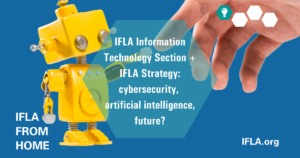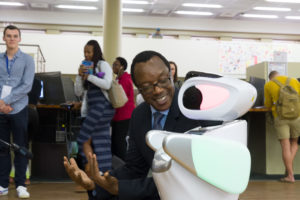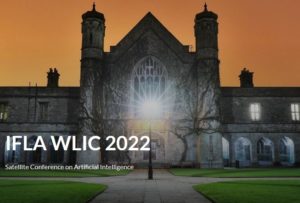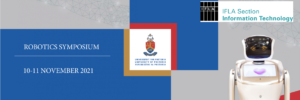IFLA Information Technology Section + IFLA Strategy: cybersecurity, artificial intelligence, future?
18 avril 2024
With an eye to disseminating information technology (IT) programmes and initiatives in a useful and practical way, IFLA’s Information Technology Section (IT Section) is actively engaging with relevant topics to support the sharing of best practices across IFLA’s membership and the global library field. These initiatives are closely aligned to the IFLA Key Initiative 2.3 “Develop standards, guidelines, and other materials that foster best professional practice”.

IFLA’s Artificial Intelligence Special Interest Group
Last month, a new IFLA Artificial Intelligence Special Interest Group (AI SIG), sponsored by the IT Section, was approved by IFLA’s Governing Board. AI is a fast-growing area globally and it is important, if not critical, for libraries to be engaged in greater understanding of its impact on the profession as well as library operations and services. The 2020 IFLA Statement on Libraries and AI outlined key considerations and recommendations for the use of AI technologies in the library sector and the establishment of the AI SIG will support the implementation of the recommendations as well as adding value and impact to the Statement.
The AI SIG plans to hold virtual and in-person events, including a 2022 WLIC Satellite Meeting and WLIC open session with invited experts, on AI developments and advances, host discussions on issues related to ethics, privacy and equity, develop tools to increase AI and algorithmic literacy skills and competencies, and gather global best standards and practices as examples of excellence on implementation for the library and information field. The satellite meeting will feature workshops, presentations and discussion forums, following on from their successful collaboration in the AI & Robotics symposium hosted by University of Pretoria.
Statement on Cybersecurity
 In collaboration with IFLA’s Policy and Advocacy team, the IT Section recently released a Statement on Cybersecurity. This statement sets out some of the key cybersecurity concepts and principles for libraries seeking to navigate this field – as well as how these intersect with library commitments to intellectual freedom.
In collaboration with IFLA’s Policy and Advocacy team, the IT Section recently released a Statement on Cybersecurity. This statement sets out some of the key cybersecurity concepts and principles for libraries seeking to navigate this field – as well as how these intersect with library commitments to intellectual freedom.
The new statement outlines:
- What cybersecurity means for libraries – and the information system components this encompasses
- Key areas for library engagement and advocacy
- The relationship between cybersecurity and privacy
- The actions libraries can take if they have full or partial control over their information systems – and if they are a part of a wider institution, or rely on third-party vendors
- What library associations and governments can do to support a safer digital environment
IT Section future plans
The IT Section plans to produce a skills registry including various aspects: cybersecurity, AI expertise, Big Data services management, software engineering, data stewardship, automation and more. They also plan a series of membership engagement and connection opportunities. Visit the Information Technology Section website, follow them on Twitter and Facebook and subscribe to their mailing list to stay up-to-date on their work.
To learn more about engaging with the work of the AI SIG, formally or informally, please contact the IT section members Edmund Balnaves, Cory Lampert, François-Xavier Boffy or Elena Sanchez.



